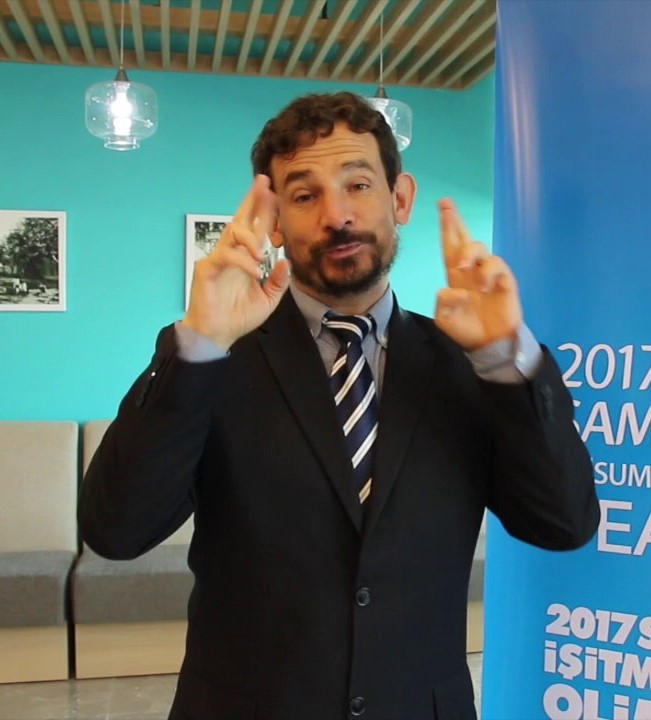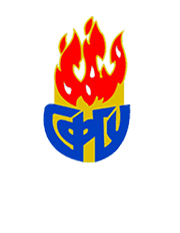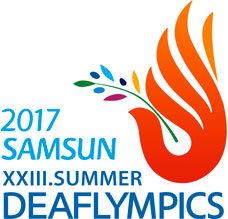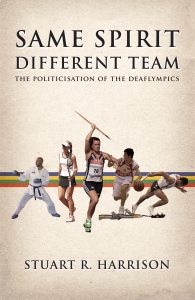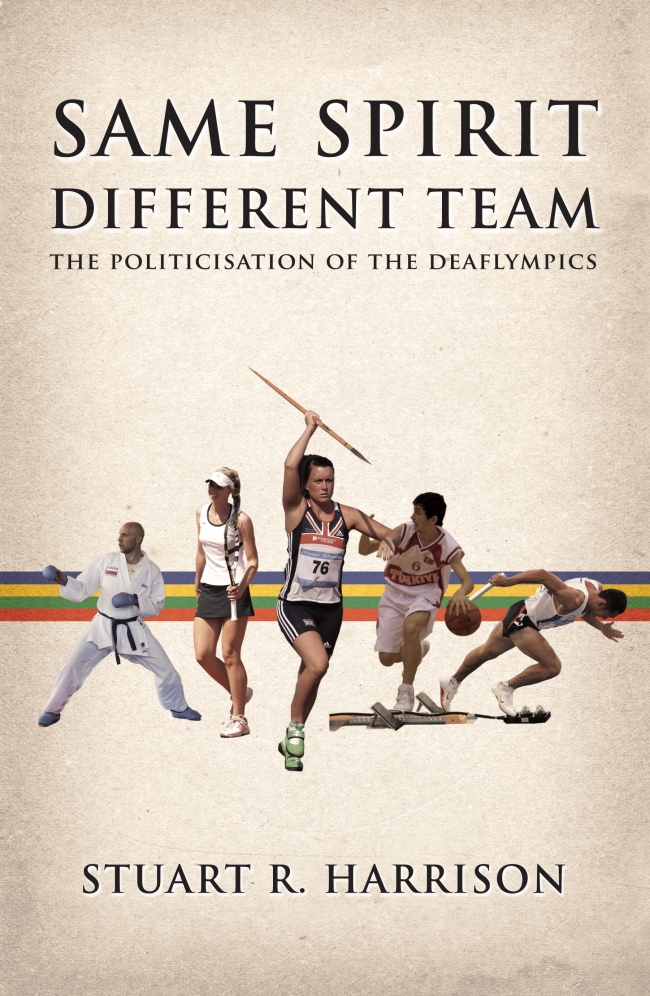A common question I often get asked : “Are the Deaflympics really necessary?”
The straight answer is “Absolutely.” However, people seek justification for that assertion – they want to understand it in ways that they can relate to.
Recently, I came across a short video of Helen Willis and her life as a student at university. Helen wears a cochlear implant and the video explains the pros and cons of day to day living. Before you read the rest of this post, you need to watch the film, (there are subtitles and there is some sign language) It is only about 9 minutes long so please bear with me and come back to this page once you have finished watching here.
Welcome back. Now, I suspect that some of you will have already decided how some scenes in that video give clear reasons why the Deaflympics are really necessary for the benefit of Deaf people. However, if you are still unsure, allow me to elaborate.
The IOC, in its wisdom, believe that the Deaflympics segregate Deaf people from society. On the contrary, the Deaflympics are necessary to provide opportunities to a balanced world of “silence and synthetic sound”. Although there have been advances in Cochlear Implant technology that now overcomes some of the limits in Helens implant, there is still a need for assistive technology and other resources to enable a Deaf person to function independently. Implants are not a cure and flashing doorbells, electronic note-takers, sign language and the company of other deaf people is still required.
The Deaflympics are necessary because the IOC and sport has not yet solved the barriers that prevail in sport. It is said that the ‘rules of the game’ do not need to be adapted for deaf people – but the environment does. Opportunities to improve communication for Deaf athletes and others in the sports environment remain uncharted, untapped and under-resourced. The assistive technology already in use at the Deaflympics is still not a regular feature in the sports competitions run under International Federation rules. Sports officials are also still ignorant to the simple changes that can be made to enable Deaf athletes to respond when play is stopped. Thus, the Deaflympics are necessary in order to teach the IOC and sport what is required to become inclusive.
The Deaflympics are necessarily important for society because the development of an elite athlete is similar to the career development of every employee of working age and there are two areas that need attention in order to progress, succeed and get promoted. The first area is the development and practice of skills and activity of the job itself, this has to be done in the most efficient and effective way possible. The second area is the continuing professional development, socializing and networking that enables the worker/athlete to take on more information, insights and confidence to develop their skills and activity area further.
Helen’s experience as a student in an elite academic environment mirror the same difficulties facing Deaf athletes who work hard to function in the elite sporting environment. Like Helen, their brains have to work overtime to fill in the gaps so they can understand the complex information that their coaches are conveying. So much brain-power is used, just keeping up with the coaches and other support staff that assistive technology and resources or changes in behavior and working practices are required.
The sports environment is still very much like the pub scenario described by Helen. She is amongst fellow elite students but she feels useless, all she can do is watch people lips move because it is impossible to understand every word despite being skilled at lip-reading. The ability to contribute is an important measure of a persons worth to others.
The Deaflympic pathway is necessary because it is an untapped source of Olympic talent that has only been utilised by a very small minority ( Terence Parkin, Dean Barton-Smith ) to balance out or springboard up to the next level of elitism. Unfortunately, governments and national governing bodies are blinkered by the Olympic/Paralympic monopoly as the only pathway for disabled athletes. By doing this, they have marginalised elite deaf athletes to the back of the queue when it comes to access to the funding and resources required to succeed. I have covered the impact of this monopoly extensively in the book; Same Spirit Different Team.
The Deaflympics are really necessary because sport and physical activity are beneficial to people’s personal health, well-being and academic/economic efficiency. The same is obviously true for Deaf people, well, it was at one time, when educational systems based on Deaf schools fostered the adoption of active healthy lifestyles engineered through the school – community links that prevailed. Nowadays, that has all but disappeared. Deaf sport has been fragmented and in some localities obliterated into extinction.
The workplace is a stressful environment for everyone and it is possible find ‘release’ in sport and physical activity or other forms of recreation that takes our noses off the grind-stone and allow us to relax and recharge. But not so for Deaf people, the bolt-holes everyone takes for granted are still stressful environments for Deaf people and Helen’s involvement in Dancesport is a good illustration that sport is the ‘happy place’ we can all escape to and ‘forget our cares and lose ourselves’.
Like Helen, all Deaf people seek out the benefits of sport within the mainstream environment, in the local clubs and facilities that are close to hand. But as we saw in the video, the acoustic environment of sport does not lend itself well to effective listening and communication. The interviewer in the video asks Helen “When do you hear? – When do you hear about the results?”. Helen answers “I think I am going to be very happy with it. I’ll be very happy with whatever they say”. Realizing that Helen had not understood the question, the interviewer patiently tries again “Do you know when you hear?” and Helen was able to answer the original question, thus contributing effectively.
The important point to consider here is that this was a one off situation in the relatively short relationship between the interviewer and Helen that lasted for the duration that the film was made. But this occurs more often in the daily relationship between Deaf and hard of hearing people and their hearing friends, colleagues and family members. This scenario repeats itself time and time again, people lose patience and draw away and stop communicating with deaf athletes because it becomes burdensome. I once came across a declaration made by a hearing person that you can invite your Deaf friend to a party once, but only once because the situation with communication was too awkward.
In the film, Helen’s parents are supporting her at the dance competition. Whether or not this is a usual occurrence is irrelevant but their presence serves to answer another point about the support structures that elite athletes need and how this can be found in the Deaflympics. There was someone in the sporting environment that was able to communicate more effectively with Helen as a competitor and provide her with the stress-free interactions that enable the athlete to stay calm and composed under pressure.
If we do eventually succeed in persuading the IOC and sport to recognise and support the Deaflympic pathway correctly, the majority of athletes in the Summer and Winter Deaflympic will still not reach the pinnacle of the Olympics, but they will at best have been given the opportunity to reach their potential. This is true in the case of Rajeev Bagga, five-time Deaflympic badminton gold medalist. Bagga never reached the Olympics, but he did compete in the Commonwealth Games and other world –ranking events. Now retired from the Deaflympics, he still competes internationally in mainstream Masters badminton for England and is now sharing his knowledge and experience with Deaf and hearing people as a badminton coach through opportunities that have been created by Sport England recognizing the key strategic importance of UK Deaf Sport, the British representative of the Deaflympic movement and its network of sports opportunities offered by third sector deaf organisations and their partnerships with national governing bodies and other providers of physical activity. We are only just starting to get there.
We can argue that some political decisions that were made in the late 1980s and early 1990s by the leadership of the Olympic, Deaflympic and Paralympic movements have denied Bagga the opportunity to compete at the Olympics. The International Committee of Sport for the Deaf and Deaf sport needs to learn from this and move forwards. Deaf sport needs to teach society that the Deaflympics are necessary and have much to offer non-deaf people in return.
If you want to know what those benefits are right now or need further information on the politics that have shaped Deaf sport into what it has become today, read Same Spirit Different Team, the latest book on the Deaflympic games.
Thank you to Helen for sharing her experiences with us.

